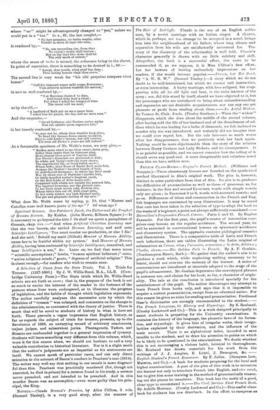NovEr,s.—Claude Branca's Promise, by Alice Clifton, 3 vols. (Samuel Tinsley),
is a very good story, after the manner of The Heir of Redclyffe. Claude is the son of an English noble- man, by a secret marriage with an Italian singer. A chance, which is, perhaps, not too strange to be accepted in a novel, brings him into the neighbourhood of his father, whose long silence and separation from his wife are satisfactorily accounted for. The story of the discovery of the relationship is well told. Claude's character generally is drawn with no little subtlety and skill. Altogether, the book is a successful effort, the more to be commended if, as we suppose, it is Miss Clifton's first effort. Let her beware of leaving melancholy impressions on her readers, if she would become popular.—Frozen, but Not Dead. By "A. W. B. W." (Samuel Tinsley.)—A story which we do not doubt to be well-intentioned, but which we cannot call instructive, or even interesting. A hasty marriage, with love eclipsed, but reap- pearing with all its old light and heat, is the main interest of the story ; nor, did this stand by itself, should we have objected to it, but the personages who are introduced to bring about misunderstanding and separation are not desirable acquaintances, nor can any one get pleasure or profit from reading about them.—An Artful Widow. By Vernon St. Clair. 3 vols. (Tinsley Brothers.)—When the" widow" disappears, which she does about the middle of the second volume, after having sold the life of her husband and of the detachment of sol- diers which he was leading for a bribe of diamonds, we felt inclined to wonder why she was introduced, and certainly did not imagine that we could ever regret her. But the tale becomes so much worse after her disappearance, that we positively wish her back again. Nothing could be more objectionable than the story of the relation between Harry Graham and Lady Bickers, and its consequences. It is as painful as possible, and we cannot conceive how the telling of it should serve any good end. A more disagreeable and valueless novel than this we have seldom seen.


































 Previous page
Previous page